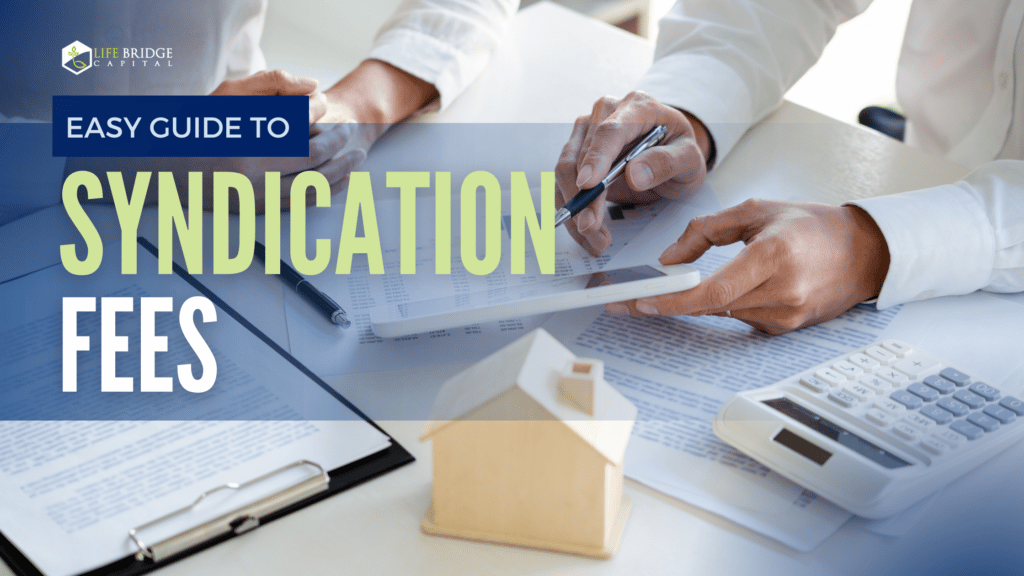
Syndication fees reduce the amount of revenue remaining to split among passive investors, but they provide much-needed compensation to the project sponsor and other professionals that carry out the syndication’s operating plan. Let’s look at the most common fees that you will encounter in real estate syndications.
Life Bridge Capital is a leading real estate syndication company. We offer our investment partners the opportunity to leverage shares of multifamily rental properties into a passive monthly income. Learn More.
What Are Real Estate Syndication Fees?
Syndication documents disclose the expected returns and compensation structure for all parties involved with the project. While returns-based profit splitting makes up most of the earnings for passive investors and the sponsor, several fees usually factor in before any returns are paid.
When evaluating a possible syndication deal for investment, review the proposed fees to determine whether they seem in line with industry standards. Fees vary from deal to deal because they are points for negotiation, and knowing the expected fees for a particular project can better help you predict your possible returns. To better analyze a syndication’s projected returns, confirm whether they are based on revenue after a sponsor’s fees.
Acquisition and Disposition Fees
Two of the most common syndication fees are for the acquisition and disposition of the asset. Upon the initiation of a project, and again at termination, the sponsor engages in important, time-consuming work to buy and then sell the property.
One can view these fees in two different ways. First, if the sponsor did not take care of these tasks, then the syndication would have to pay someone else a commensurate amount to take on the job. Second, the sponsor should be fairly compensated for work they do, and adequate payment further motivates the sponsor to make good deals for the project.
Typically, acquisition fees range between one and four percent of the property’s purchase price, whereas disposition fees rarely exceed two percent. Each of these fees is paid to the sponsor at the transaction closing.
Refinance Fee
When a sponsor successfully refinances the property, they may be entitled to an additional, smaller fee, which is usually no more than one percent of the new loan amount.
While refinancing can be a critical part of the syndication plan, not all syndications provide the extra payment to the sponsor. Nevertheless, doing so is a nice touch, as the passive investors greatly benefit from the influx of cash. It may be a necessary follow-up to the original financing that occurred at the time of purchase.
Loan Guaranty Fee
Financing is a critical part of a syndication project, and consequently, the source of many fees, with another being the loan guarantee fee. This negotiable fee may be paid to the sponsor or other party, who personally guarantees the property loan in compensation for the risk assumed.
The loan guarantee fee varies from one to three percent of the loan amount. For more on Multifamily Loans, you can read our guide here.
Property Management Fee
Whether paid to the sponsor or to a property management company, a fee for the oversight and handling of a property is unavoidable and based on the size of the property.
Property management entails everything from tenant customer care to sourcing professionals to provide repairs and maintenance to the building. They may even handle marketing and advertising for the property. Ultimately, efficient, professional property management is the key to a property’s success.
Property management fees are typically a percentage of the collected rent. For up to 100 units, the rate may be anywhere between four and ten percent, depending on the level of services the company provides. The percentage charged declines as the number of units increases as economies of scale make management more efficient.
Asset Management Fee
Another widely used fee is the asset management fee, which compensates the sponsor for the many duties related to coordinating the care of the property and communicating with investors and is separate from the property management fee.
The asset management fee covers the time spent updating investors, tabulating and dispersing distribution checks, overseeing the property management company, and handling all the other administrative tasks that come along with the project.
This fee is typically based on the gross revenues generated by the property and may range between one and two percent.
Real Estate Commissions
Upon the purchase and sale of the property, the real estate broker usually receives a commission based on the percentage of the purchase price. If the sponsor is a licensed broker, they may receive that commission themselves, but the intention must be disclosed to investors and must be on par with the typical rate charged in that area.
Sponsors who are not licensed in the state where the property is located may not earn a real estate commission. Alternatively, the syndication may pay this fee to a third-party real estate broker.
Final Thoughts
Fees compensate the sponsor for time spent on the project, but the promotion serves as the real reward for a job well done.
Life Bridge Capital is a leading real estate syndication company. We offer our investment partners the opportunity to leverage shares of multifamily rental properties into a passive monthly income. Learn More.


